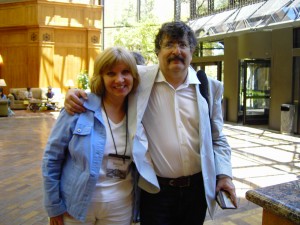Meet Gene Weingarten, one of my personal heroes
When I saw Gene Weingarten’s name on the list of speakers for the 2011 Mayborn Literary Nonfiction Conference, I immediately clicked on “register now.” In March 2009, his Washington Post story, “Fatal Distraction,” brought national attention to a problem that most people don’t even want to think about, much less discuss: parents who accidentally kill their kids by leaving them in cars. It won him his second Pulitzer for feature writing,
His first Pulitzer, in 2008, was for writing about what happened when Joshua Bell, a violin virtuoso, played for small change in a Washington, DC, subway station. Both stories appear in his most recent book, The Fiddler in the Subway, a compilation of his long-form narratives.
Last Sunday, the final day of the conference, I found Gene in the reception area of the Dallas Executive Conference Center, a plate of food in his hand. A burley, hunkering guy, the word “bear” comes to mind when I try to describe him. I was glad I arrived early. “You’re my hero, Mr. Weingarten,” I said.
“No. You’re my hero,” he countered.
I shook my head and tried not to laugh. I told him I found “Fatal Distraction” on the Internet while researching a story of my own.
“Which case were you reporting on?” he asked.
 I wasn’t covering a particular case. It had just been a very bad year and I wanted to write something about the increase in incidents. To localize the story I talked to a hospital trauma and injury prevention specialist and hit up a few organizations that specialize in kids and car safety.
I wasn’t covering a particular case. It had just been a very bad year and I wanted to write something about the increase in incidents. To localize the story I talked to a hospital trauma and injury prevention specialist and hit up a few organizations that specialize in kids and car safety.
During the Q & A, I asked Gene what he said to the 13 parents he interviewed to get them to open up. How could their stories not be self-incriminating?
What he said next helped me understand why he went after the story in the first place. He had driven to the office one day and was about to run in when his daughter Molly— who had been asleep in the back seat— woke up and said something. He had forgotten she was there.
By sharing his own brush with tragedy, Weingarten won their trust.
When he announced that he isn’t good at public speaking, or at answering questions, I felt a collective sigh of disappointment. He was right, though; he isn’t any good at it. What he is good at is having conversations; and in talking with the audience, he gave us what we came for: a window into the writer’s mind. Kicked back and thoroughly entertaining, Weingarten took us on an interactive tour of one of his stories, start to finish.
The story was about a typical non-voter. A concrete worker with a wife and kids. After spending a good amount of time with the guy, Weingarten was ready to call it quits. He hadn’t gotten everything he’d come for, but would go with it anyway. It was an “okay” story, he said. Maybe a “B.”
During a Sunday barbeque, the story came to a boil. The men were pitching horseshoes and the ladies inside the house. That’s when he got the real story. He found common ground with the men, and what he wrote turned out to be an “A.”
In the end, after even more discussion on the ethics of reporting, I not only felt that I knew Weingarten better, but was ready to find out who I am as a writer as well, and put myself inside the story. FFG
Read “Fatal Distraction” at http://www.washingtonpost.com/wp-dyn/content/article/2009/02/27/AR2009022701549.html.





Leave a Reply